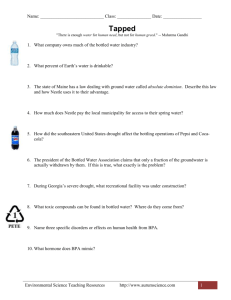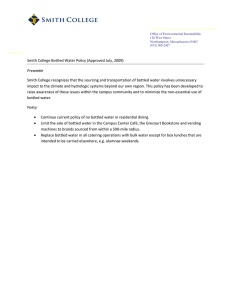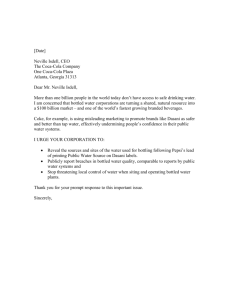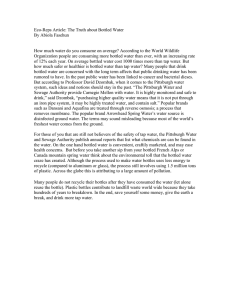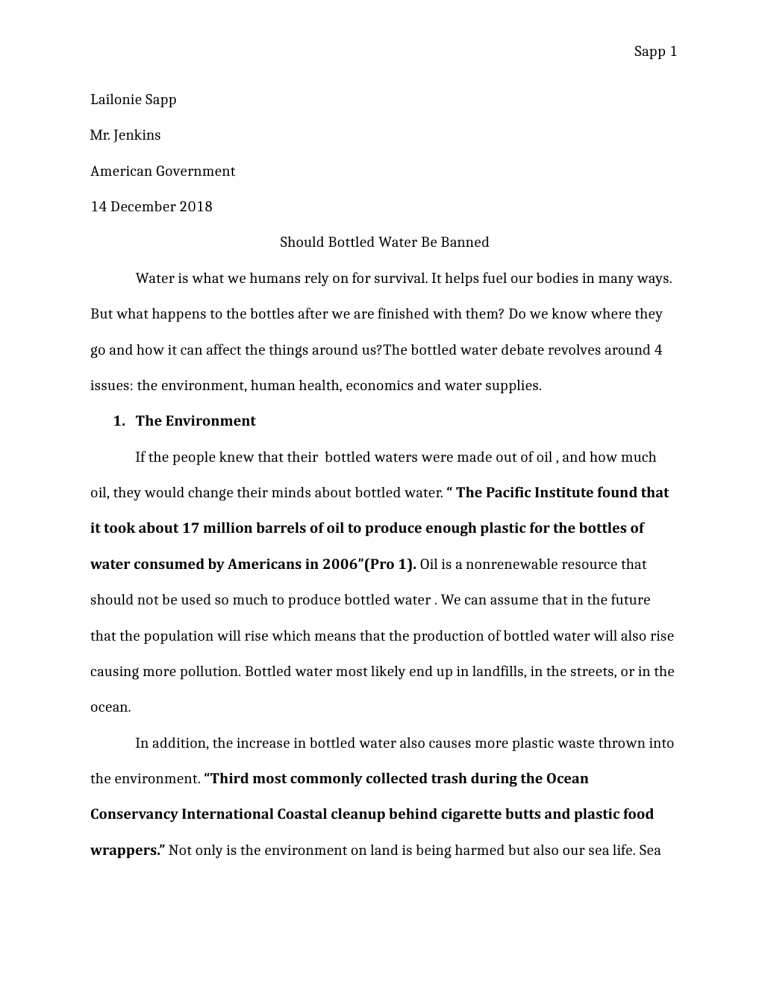
Sapp 1 Lailonie Sapp Mr. Jenkins American Government 14 December 2018 Should Bottled Water Be Banned Water is what we humans rely on for survival. It helps fuel our bodies in many ways. But what happens to the bottles after we are finished with them? Do we know where they go and how it can affect the things around us?The bottled water debate revolves around 4 issues: the environment, human health, economics and water supplies. 1. The Environment If the people knew that their bottled waters were made out of oil , and how much oil, they would change their minds about bottled water. “ The Pacific Institute found that it took about 17 million barrels of oil to produce enough plastic for the bottles of water consumed by Americans in 2006”(Pro 1). Oil is a nonrenewable resource that should not be used so much to produce bottled water . We can assume that in the future that the population will rise which means that the production of bottled water will also rise causing more pollution. Bottled water most likely end up in landfills, in the streets, or in the ocean. In addition, the increase in bottled water also causes more plastic waste thrown into the environment. “Third most commonly collected trash during the Ocean Conservancy International Coastal cleanup behind cigarette butts and plastic food wrappers.” Not only is the environment on land is being harmed but also our sea life. Sea Sapp 2 animals that consume trash ,including water bottles, soon kills them because they consume to much of it. There are also other type of beverages that have plastic containers that are more harmful than plastic water bottles, and bans don’t necessarily reduce waste.“Sports drink , enhanced water and soda produce nearly 50% more carbon dioxide emissions per serving than bottled water” (Con 2). 2. Human Health Advocates of a bottle water ban don’t argue that all bottled water is unhealthy, but how would they know if it is or not? “Tap water is more stringently regulated by the Environment Protection Agency through multiple daily test” (Pro 2). At the FDA there is only one person who regulates the testing of bottled water. The testing of bottled water is not released to the public eye unlike the testing of tap water. This can cause possible health problems as well. With such little testing the public does not know what are in these bottled water and what they are consuming. We can assume that this can lead the public to be only confident in tap water. “A study published in Environmental Science and Technology found that the chemical antimony (Sb) can leach from plastic PET bottles into the water within”(Pro 2). Antimony is a chemical that is used especially in alloys, semiconductors, and flame-retardant substance. The Agency for Toxic Substances and Disease Registry says that when too much antimony is consumed it can cause vomiting and abdominal pain. We can Sapp 3 assume that bottled water industries don’t release this type of information to the public because their businesses would start to decrease. The banning of bottled water removes a healthy choice which can lead to an increase in the consumption of unhealthy sugary drinks. “Increased consumption of zero-calorie bottled water in place of high-calorie juices and soda has cut trillions of calories from American diets”(Con 1). When taking away a healthy drink such as bottled water we can assume there could be consequences for the children of the future. According to the American Academy of Pediatrics, soft drinks pose a risk of dental caries because of their high sugar content and enamel erosion because of their acidity. 3. Economics Furthermore, we can assume that money will have a very big place in the bottled water industries. Whether it is producing it or picking up behind it. “California, Oregon, and Washington spend an estimated 500 million a year removing waste from the Pacific coastline. Including waste from plastic water bottles” (Pro 3). This bring it to how much money a family averagely spend on bottled water. “Mathematics at Penn State University estimate that spending $20 on a reusable water bottle can save the average American up to $1,236 a year; for a family of four that amounts to nearly $5,000” (Pro 3). In the eyes of advocates of pro bottle water would say that banning bottled water restricts consumers’ access to a product they want, and negatively affects small businesses. Sapp 4 “Research by Kantor Panel Worldwide found that 40% of all water servings come in the form of bottled water” (Con 4). 4. Water Supplies “In Pakistan, groundwater levels were developed in a village neighboring a Nestle bottled water production plant, resulting in the local water supply turning to sludge” (Pro 4). The Pakistan people local water source has been contaminated In, conclusion, supporters of a water ban point out that the production and consumption of disposable water bottles are bad for the environment, while the industry maintains they are taking steps to reduce their impact on the environment. On the issue of human health supporters of a ban believe that both the water bottles and the water inside may be dangerous, and the industry is worried that people will make unhealthy beverage choices if water bottles are banned. Thirdly, proponents of aban suggest that bottled water is a waste of money for consumers and the industry counters that idea with the belief that consumers have the right to choose what they spend their money on. Finally, tap water advocates assert that the water bottle industry is draining local water supplies to fill their bottles while the industry holds the idea that bottled water is necessity for emergency preparedness. My opinion on this issue is That we should lessen our use of bottled water because of the effects that it has on the planet and the nature around us. Sapp 5 Works Cited “Should Bottled Water Be Banned? - Top 4 Pros and Cons.” procon.org, Thursday, June 14, 2018 ,https://www.procon.org/headline.php?headlineID=005401.
